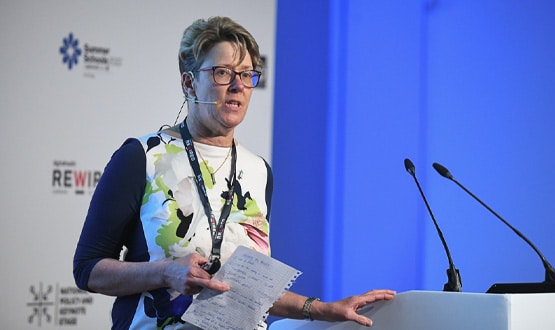Navigating digital transformation in healthcare
- 29 February 2024

Ahead of Rewired 2024, Beverley Bryant, CDIO at Guy’s and St Thomas’ NHS Foundation Trust and King’s College Hospital Foundation Trust, shares insights in Computer Weekly from their joint digital transformation journey: the Apollo project
As the chief digital information officer (CDIO) at Guy’s & St. Thomas’ Foundation Trust and King’s College Hospital Foundation Trust, I’ve been at the forefront of implementing innovative digital solutions. Our mission is to harness the power of technology to streamline healthcare delivery, making it more efficient, accessible, and patient-centric.
The cornerstone of our digital transformation journey was the Apollo project which started in 2019. This ambitious project aimed to integrate clinical systems across six hospitals and community services into a single, cohesive electronic patient record (EPR) system. By leveraging the capabilities of Epic’s EPR, we weren’t just upgrading our technology, we were fundamentally reimagining how patient care is delivered. But it was more than just an EPR – this system replaced our outdated, siloed databases with a unified platform, enabling seamless communication, reducing the potential for errors and ensuring that patient care is both efficient and personalised.
The Apollo project was inspired by a singular vision: to harness the power of technology to make healthcare delivery more efficient, accessible and patient-centric. With Epic’s EPR system, our objective has been to break down the existing barriers of compartmentalised databases, creating a streamlined platform that supports uninterrupted communication and reduces inaccuracies.
Key transformation lessons learnt
We learnt a lot as we went through the project, and I know how daunting it can be to be starting it at the very beginning so here’s my top seven takeaways for anyone else embarking on this kind of project themselves:
- Command centre efficiency: We asked for insight from both NHS and international colleagues who all said that it was important to establish a command centre for our “go-live” event – a decision that proved instrumental. This hub allowed us to manage issues in real time and streamline communications, embodying an efficient structure that resonated well within the NHS framework.
- Enhanced at-the-elbow support: Recognising the challenge of transitioning to a new system, we bolstered at-the-elbow support post-launch. By deploying Epic experts throughout our hospitals, we provided our staff with the immediate assistance needed to navigate the new system, significantly easing the transition process.
- Cultivating digital champions: The role of digital champions – our internally trained advocates for change – was crucial. Yet, maintaining their engagement amidst their regular duties highlighted the need for a balanced, sustainable support model to ensure the longevity of our digital transformation efforts.
- Attention to detail in procurement: The Apollo project underscored the importance of meticulous attention to procurement details. A potential crisis was averted by closely examining specifications, such as units of measurement for label printers, demonstrating how seemingly minor details can have significant operational implications.
- Printer setup complexity: Despite exhaustive testing, we encountered unexpected challenges with printer setups due to IP address conflicts. This was a clear lesson in the importance of preparedness and adaptability in the face of unforeseen technological hurdles.
- Innovating training models: Faced with constraints on physical training spaces, we developed an innovative training model that combined online basic training with role-specific sessions and continuous support. This approach not only facilitated successful user adoption, but also demonstrated our ability to adapt and innovate in response to logistical challenges.
- Robust reporting: The strategic decision to delay our go-live date ensured that our reporting and work queue management systems were fully operational. This focus on preparedness was essential for meeting national reporting targets and maintaining system stability post-launch, reinforcing the importance of a thorough and measured approach to digital transitions.
Going through a digital transformation is always a learning curve, but having strong leadership and collaboration is the key to making it a success. For me, it was very important that both sets of clinical teams were involved in the design, that it wasn’t one team designing and building it and then imposing it on the other to get ownership and buy in.
Engaging with the future: Beyond Apollo
The Apollo project is just the beginning of our journey towards a digitally transformed healthcare system. Our commitment to continuous improvement, patient-centred care, and technological innovation continues to drive us forward. Looking ahead, we’re exploring how emerging technologies like artificial intelligence and machine learning can further enhance operational efficiencies and patient outcomes.
As we look to the future, the principles and learnings from this project will undoubtedly continue to influence and shape to drive us towards a more efficient, resilient, and patient-focused healthcare system.
Bryant will be speaking at Digital Health Rewired 2024 on Tuesday 12th March alongside Professor Ian Abbs, CEO, Guy’s and St Thomas’ NHS FT, where they will delve into the intricacies of the Apollo project.
Explore the Rewired24 programme, and register here.




